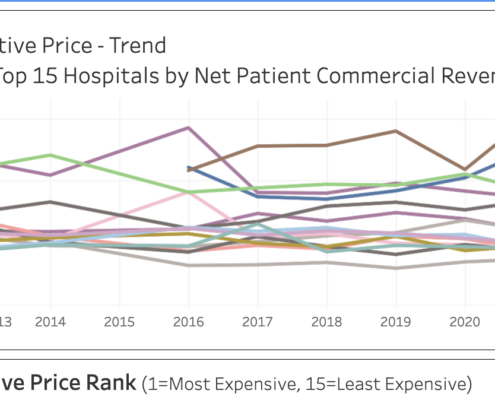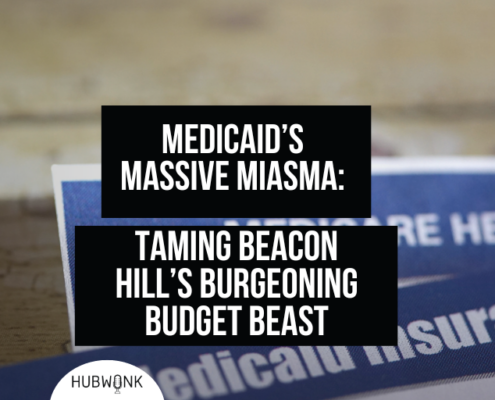
Massachusetts’ Workforce Growing Older and More Diverse, Remains Highly Educated
State relies on highly skilled immigrants to counteract net…

Johns Hopkins’ Ashley Berner on Educational Pluralism & Democracy
Johns Hopkins’ Institute for Education Policy director, Dr. Ashley Berner discusses educational pluralism's role in improving K-12 performance, exploring European models and the impact of U.S. school choice programs. Dr. Berner analyzes universal ESAs and vocational-technical schooling, addressing persistent academic struggles and civic knowledge gaps.

Why the secrecy? Pioneer Calls for Open Meetings Dealing with Steward’s Impact on Patient Care.
Recently the Healey administration’s Department of Public health…

Industrial Policy Reimaged: Can Government Improve Free Markets
Joe Selvaggi discusses industrial policy, its aspirations and limitations, with CATO Institute Associate Director Colin Grabow, in response to Senator Rubio's thought piece advocating for a more active role for government in the economy.

39th U.S. Poet Laureate Robert Pinsky for National Poetry Month
Boston University professor, Robert Pinsky discusses his memoir Jersey Breaks: Becoming an American Poet; the enduring influence of sacred texts like the Psalms; and the wide cultural significance of classic poets like Homer and Shakespeare.

Posting Patient Prices: Transparency Cure for Hospital Blank Checks
Joe Selvaggi interviews entrepreneur, philanthropist, and founder of PatientRightsAdvocate.org, Cynthia Fisher, discussing her research and advocacy for enhanced healthcare price transparency. This initiative has the potential to improve life expectancy and save Americans over a trillion dollars annually.

Pioneer Institute Statement on the Commonwealth of Massachusetts’ March Tax Revenue Collections
Pioneer Institute Statement on the Commonwealth of Massachusetts’…

U.S. Chamber Foundation’s Hilary Crow on K-12 Civics Education
U.S. Chamber Foundation VP, Hilary Crow discusses the state of K-12 civics, emphasizing the Chamber Foundation’s role in addressing America’s wide civic education deficits. Crow highlights a recent national civics survey, alarming civic literacy gaps, and links between political unrest and our nation’s educational shortcomings in K-12 civics.

Constitutional Property Taking: Exclusionary Zoning’s Costs to Owners and Society
Joe Selvaggi talks with George Mason Law Professor Ilya Somin about the the costs, benefits, and legal foundations of exclusionary zoning argued in his recent paper: The Constitutional Case Against Exclusionary Zoning.

Mayor Wu’s Commercial Property Tax Proposal: A Solution or a Snuff?
Boston Mayor Michelle Wu is considering shifting more of the…

Transformative Medical Therapy Will Require New Cost-Benefit and Pricing Models
Current regulations increase development and manufacturing costs,…

UCLA’s Ronald Mellor on Tacitus, Roman Emperors, & Despotism
Dr. Mellor delves into the enduring influence of Tacitus, the great Roman historian, on both America’s Founding Fathers and contemporary understanding of politics and government. He discusses Tacitus's insights on the early Roman emperors, unchecked authority, moral judgment of leadership, and the decline of the Roman Republic, as well as ancient lessons for modern governance.

Poor Housing Incentives: Tax Credits Reward Politicians Not Neighbors in Need
Joe Selvaggi interviews Chris Edwards, Chair of Fiscal Studies at CATO Institute, about his research on the 40-year history of Low-Income Housing Tax Credits. They delve into its features, effects, and potential alternatives that could provide greater benefits at lower costs to taxpayers.

Tufts Prof. Elizabeth Setren on METCO’s Proven Results
Prof. Setren discusses her recent study of METCO, a pioneering voluntary school desegregation program under which Massachusetts students in Boston and Springfield are bused to surrounding suburban districts. She discusses METCO's history, the academic performance of students in the program, enrollment challenges, long-term benefits, and disparities among students.

Biden’s Budget Breakdown: Pragmatic Progress or Political Posturing
Joe Selvaggi talks with Manhattan Institute Senior Fellow Brian Reidl about how the contours of President Biden’s recently released budget proposal reveal a persistent, bipartisan reluctance to address profound structural deficits.

Sunshine Week 2024
Partly Sunny with a Chance of Transparency
As Pioneer Institute…

Pulitzer Winner Joan Hedrick on Harriet Beecher Stowe & Uncle Tom’s Cabin
Prof. Hedrick discusses Harriet Beecher Stowe's wide literary influence on U.S. history. From her abolitionist activism to the publication of international bestseller Uncle Tom's Cabin, they explore Stowe's New England upbringing, anti-slavery convictions, and lasting impact on American literature and social reform in the 19th century.

Genetic Therapy Revolution: Benefits and Barriers for Medicine’s New Horizon
Joe Selvaggi talks with neurobiologist and writer Dr. Anne Sydor about the potential for gene therapy to address deadly and debilitating diseases and how current health care models must adapt to encourage this nascent technology.

Dr. Adrian Mims on The Calculus Project & STEM
Dr. Mims navigates through the contentious "math wars" and underscores the pivotal role of Algebra I as a gateway to higher math. He also evaluates the negative impact of Common Core math standards, and proposes strategies to combat pandemic-induced learning setbacks and bridge the gap in math proficiency between American students and their international counterparts.

Contours of Content Curation: SCOTUS Hears Online Free Speech Cases
Cato Institute's Thomas Berry, talks about oral arguments at the Supreme Court in the NetChoice cases, exploring the First Amendment questions that affect both social media users and the platforms that curate their content.

Boston Children’s, MGH Among Massachusetts Hospitals with Highest Relative Commercial Prices
Pioneer Institute's new tool, the Massachusetts Hospital Relative Price Tracker, displays relative price and facilitates relative price comparisons among hospitals. The average price among all hospitals will have a relative price of 1.0. A relative price of 1.5 means that a hospital charges 50 percent higher than the average of all Massachusetts hospitals. Similarly, a relative price of 0.84 means that a hospital’s prices are 16 percent below average. Relative price data is collected and reported by the Commonwealth’s Center for Health Information and Analysis (CHIA) and is an aggregate measure used to evaluate price variations among different hospitals. It is recalculated annually based on data collected from commercial payers and includes information on private commercial insurance and commercially managed public insurance products such as Medicare Advantage and Medicaid Managed Organizations/Accountable Care Partnership Plans.

Yale University Pulitzer Winner Beverly Gage on J. Edgar Hoover & the FBI
Yale Prof. Beverly Gage, author of "G-Man: J. Edgar Hoover and the Making of the American," delves into the enigmatic life and career of J. Edgar Hoover, tracing his formative years in Washington, D.C., his rise to prominence as director of the FBI, and his enduring influence on American law enforcement and politics.

Mortgage’s New Normal: Guide to Better Borrowing Amidst Higher Rates
Joe Selvaggi talks with mortgage expert, Trip Miller of Cambridge Savings Bank, about mortgage rates and trends and explores best practices for finding a mortgage structure that suits individual buyers’ needs.

Study: Ed Reform Has Improved Academic Performance and Equity
Over the past 30 years, rigorous standards, assessments, and accountability for outcomes have propelled Massachusetts public schools to become the nation’s best. Taking away the high-stakes component of MCAS would weaken the accountability system and lead stakeholders to de-emphasize the assessment data that drives high-quality instruction, according to a new study published by Pioneer Institute.

UK U-Warwick’s Benjamin Smith on Mexico’s Cartels & Drug Trade
Prof. Benjamin Smith, author of The Dope: The Real History of the Mexican Drug Trade, provides insights into various aspects of the Mexican drug trade, including its historical context and the evolution of illicit drug products over time. He discusses key cartels and their methods, the impact of the drug trade on Mexico's murder rates, the immense financial scale of the trade, its effect on Mexico and the U.S., and the challenges law enforcement face in combating it. Smith explores the relationship among Mexican cartels, other foreign countries, and the illicit drug market in the U.S.

Medicaid’s Massive Miasma: Taming Beacon Hill’s Burgeoning Budget Beast
Marc Joffe, a state policy analyst at the Cato Institute, talks about his research on Medicaid's cost and size. They explore how Massachusetts can control spending growth while protecting other priorities.

Middlemen Pushing Up Retail Costs of Drugs
The reality is that non-price factors, including several players, are causing net prices to decline and retail prices to increase. Those players include employers, health plans, and pharmacy benefit managers (PBMs), all of whom have continuously circumvented the system through loopholes and complicated systems of reimbursement that tend to hurt patients

Milton Shuts the Door
on Multifamily Housing Plans
The MBTA Communities Act, passed in 2021, provides that the 177 communities serviced by the MBTA must create multifamily zones to spur housing development close to public transportation. But the issue is an emotionally charged one, with passions high on both sides. And Milton residents in February rejected a plan to create such housing ‚ choosing a loss of some state funding over an approximately 25 percent increase in their housing stock, along with the possibility of greater congestion.
on Multifamily Housing Plans

DFER-MA’s Mary Tamer on MCAS & Teacher Strikes
Mary Tamer focuses on the historic impact of the 1993 Massachusetts Education Reform Act on the commonwealth’s students’ high achievement on national and international measures. She explores the politics of the Massachusetts Teachers Association advocating against the MCAS test as a graduation requirement. In closing, Ms. Tamer also discusses the rise of teacher strikes and their implications for education reform in the Bay State.

Baystate Budget Blues: Declining Revenue Causes Concern
Joe Selvaggi engages in a conversation with Pioneer Institute’s Eileen McAnneny, Senior Fellow for Economic Opportunity, to analyze the status of the 2024 budget. They compare actual revenue and spending with pre-July 1 estimates, investigating potential reasons for any surpluses or shortfalls. They also dive into policy implications for legislators as they approach fiscal 2025.
